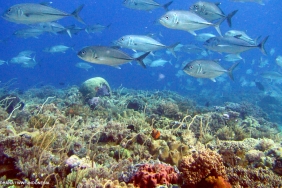MY DEAR DUGONG, MY POOR DUGONG
Author: Arit Rasit (Whale Shark Monitoring Officer in Wondama)
That morning, I was at Udin's puri boat, which has been fishing for puri and small pelagic fish around the waters of Yoopmeos Island since 2013. While I was doing my routine activities as a freelance whale shark monitor at WWF-Indonesia Cenderawasih Bay National Park, Yoop Island fishermen reported the slaughter of a dugong. Hanz Ayomi, a fisherman from Yoop Island said "Arit, there are fishermen who kill dugongs, can you go there to warn dorang? (Arit, there are fishermen who catch dugongs, can you go there to warn them?)". ".
Hanz Ayomi and I quickly headed to the location where the so-called dugong slaughter was taking place. Upon arrival, the dugong was already dead and there were several cuts from the spear or piercing used to hunt the dugong. I immediately approached the fisherman who allegedly hunted the dugong "Father, good morning, when was this dugong caught? Why did you have to catch the dugong? Do you know that these dugongs are rare and protected?" and the fisherman replied casually "I also don't hunt these dugongs every day, just because I need money so!" (I don't catch these dugongs every day just because I really need money right now).
I tried to explain that dugongs can also provide additional income without having to be killed. The fisherman again replied "ahh people don't know that so!" (I don't understand what you mean). Hearing this answer, I realized that it is important to increase the understanding and introduction of economic improvement activities without destroying nature so that our nature continues to be preserved. The fisherman explained that the dugong meat will be cut into pieces and then roasted with smoke, some of which are consumed by themselves, shared with neighbors and taken to Wasior to be sold at the market.
Evolution of Elephants nearing extinction.
Dugongs (dugong) are a type of marine mammal, one of the last surviving members of the Sirenia or sea oxen. An evolutionary relative of the elephant, the Dugong can live up to 70 years and is the only animal representing the Dugongidae tribe.Living in Indo-Pacific waters with calm water conditions at a certain temperature, dugongs are highly dependent on seaweed as a food source so that their distribution is limited to the coast where they were born.
For thousands of years, dugongs were hunted for their meat and fat. Hunting has caused the dugong's distribution area to decrease and is threatened with extinction. The IUCN has categorized the dugong as endangered, while CITES prohibits trade in goods produced by this animal.
In Indonesia, dugongs are also protected in Government Regulation No. 7 of 1999 (regulation on the management of protected plants and animals in nature reserves and nature conservation areas); and Law No. 5 of 1990 (protection of buffer systems/habitats) and articles 3, 8 and 9 of Law No. 68 of 1998 which regulates the management of nature reserves, nature conservation areas, nature reserves and wildlife sanctuaries. < br />
Protecting Nature Yoopmeos
Yoopmeos Village is one of the coastal settlements between Wasior and Windesi in Wondama Bay Regency. It is a small island, where most people work as fishermen and some women work to make fields for vegetables and gather sago. The village, which consists of 59 households, is a Protestant Christian and daily sells its catch to collectors in the village or sells directly to the main market in Wasior.
The main catches of fishermen in Yoopmeos are reef fish, lobster and squid, because it is surrounded by coral reefs and mangrove ecosystems. Seagrasses are widely spread in the waters of Yoopmeos Island, making dugongs fond of foraging in these Yoopmeos waters. WWF-Indonesia and the Teluk Cendrawasih National Park Center have tried to assist the community so that their fishing activities do not damage the aquatic ecosystem. However, there are still people who need extra assistance to jointly protect the aquatic ecosystem of Yoopmeos Island. Hopefully, in the next few years, the entire Yoopmeos community will unite to protect the aquatic ecosystem.





